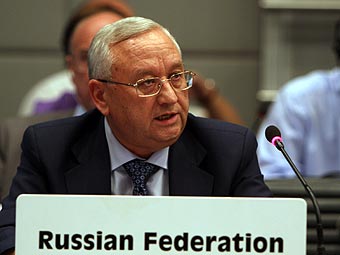Russia vetoes OSCE …again
By Temuri Kiguradze
Friday, May 15

“Russia is not against the continuation of the work of observers on both sides of the [South Ossetian administrative] border, “stated the head of the Russian delegation to OSCE Anvar Azimov on May 14. He said that Russia wants OSCE observers to work “effectively, bringing practical results.” “The scheme proposed by our partners is prepared in such a way as if nothing has happened in the region since the Georgian aggression. It doesn’t correspond to the international-juridical and political realities and simply will not be viable because the South Ossetians will not agree to it,” stated Azimov.
The separatist authorities in the Georgian breakaway region of South Ossetia are demanding the creation of a separate OSCE mission in South Ossetia, independent from the Georgian mission. Russia supports this, stating that letting the OSCE mission in Georgia work in South Ossetia means “preserving Georgia within its pre-war borders.” The Kremlin explains that this position flows from the recognition of the Georgian separatist regions as ‘independent states’ by Russia and Nicaragua after the August war. “We never made anyone recognize South Ossetia through the adoption of the observers mandate, so don’t make us reject our recognition through it,” stated Anvar Azimov, as quoted by the Russian RIA-Novosti news agency.
The Greek proposal had stated that neither Georgia nor South Ossetia would be mentioned in the title of the mission. It would have placed 22 military observers in Georgia and 8 in breakaway South Ossetia with the right to freely cross the administrative border of the separatist region. Russia protested that the monitors should be civilian, not military, and should obtain special permission from the separatist authorities each time they cross the border. These and other objections have made it impossible to reach a compromise. On May 14 the Chairperson of the OSCE Permanent Council, Greek Ambassador Mara Marinaki, said that the OSCE Chairmanship had suspended negotiations on a continued OSCE presence in Georgia “until further notice.”
"Following five months of intensive informal negotiations, it is now time to take stock of what has been accomplished," Marinaki said. "We need to review the results of our efforts to build the required consensus around the Greek proposal based on the 'status-neutral' formula that would allow the OSCE to continue its crucial work in Georgia. We have repeatedly said we need more, not less, OSCE involvement in the region. We call on all participating states to show strong political will to this end," she added. Despite the suspension of the talks, the OSCE “remains hopeful that we will still be able to reach consensus soon," reads the special statement published on May 14.
The Georgian delegation to OSCE described Russia’s position as “yet another confirmation of Russia’s isolation from the rest of the world.” Paata Gaprindashvili, Georgian envoy to OSCE, said that Russia had suffered a “complete fiasco because of its inflexible diplomacy.” “This decision [to veto the proposal] will hang over Russia like the Sword of Damocles,” he said, adding that by doing this Russia had again demonstrated that it is in contravention of the commitments it undertook in signing the August 12 and September 8 EU-mediated ceasefire deals. "We need the OSCE for monitoring, for reporting, for transparency - that's a key word here," Gaprindashvili said.
Georgia’s position was supported by the US State Department on May 13. State Department spokesman Ian Kelly said "Russia should allow the OSCE monitors complete access to South Ossetia and the surrounding region.” The OSCE Mission to Georgia, which opened in 1992, has been in the process of winding up since Russia first vetoed its continuation in late 2008. The OSCE also has 20 unarmed military monitors in Georgia who are operating under a mandate which expires on 30 June.
The OSCE is a Co-Chair of the Geneva discussions together with the United Nations and the European Union. Greek Ambassador Charalampos Christopoulos, the Special Representative of the OSCE Chairperson-in-Office, will participate in the fifth session of the discussions, to be held on the coming Monday and Tuesday in Geneva.
